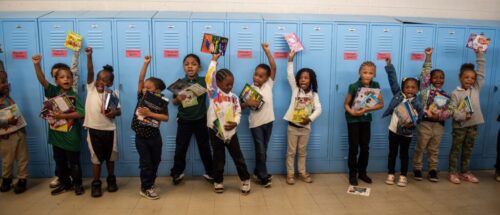Unable to contain his excitement, 9-year-old Makai danced happily in a circle while waiting in line with his five free books during the recent My Home Library Book Fair at Erickson Elementary School in Ypsilanti. He hugged the books close with titles like PIGGY, Lanky Box and Bad Bunny nearly falling out of his grasp.
“Oooo I can’t wait to read these— I’m so excited, and I don’t have to pay,” said Makai. “This is like $3,000 worth of books!”
While $3,000 is an exaggeration of the cost for Makai’s five books, United Way for Southeastern Michigan is projected to invest $130,413 in books provided by My Home Library Book Fairs. Over the last school year, United Way has ensured the distribution of 37,552 books across our region.
This year, in addition to book fairs at our four Community Schools in Pontiac, Southfield, River Rouge and Hazel Park, we have also spread the love of reading to Glazer Academy, Brenda Scott Academy, Daly Elementary, Global Tech, Noble Elementary-Middle School, Robeson/Malcom X Academy, Detroit Academy of Arts and Sciences and Detroit Academy of Americas.
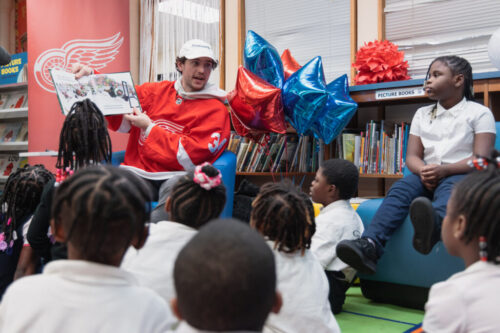
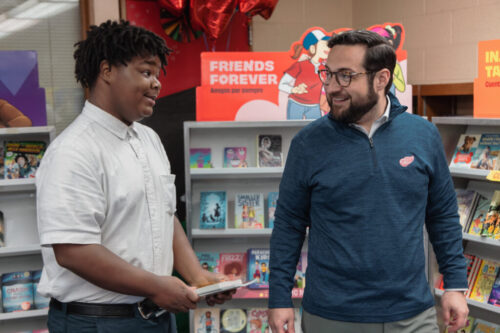
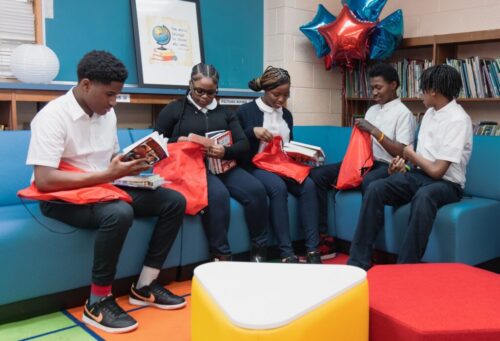
“One of the things that we’re trying to do, especially looking at our ALICE numbers, is really provide book fairs to schools where there’s a need,” said Pamela Todd, director K-12 initiatives at United Way for Southeastern Michigan. “The literacy rates are low across the board, so we want to reach as many schools and students as possible.”
Outside of the classroom, United Way has worked with partners and volunteers to install and fill our 28 Little Free Libraries across communities and has delivered 1,500 literacy kits to daycares, food pantries, shelters and other non-profits in our region.
“Little Free Library locations are based on ALICE data, and they’re in spaces where people will be passing by,” said Tiffany Mousel, literacy initiatives manager at United Way for Southeastern Michigan. “And the kids really enjoyed getting those literacy kits, some of the kids in after-school programming were really excited about that.”
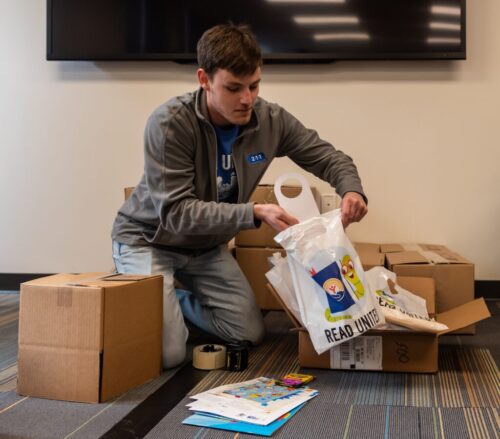
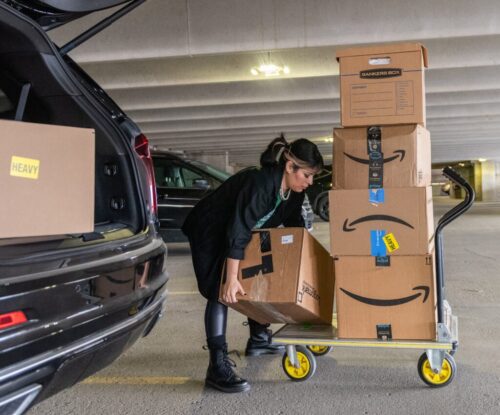
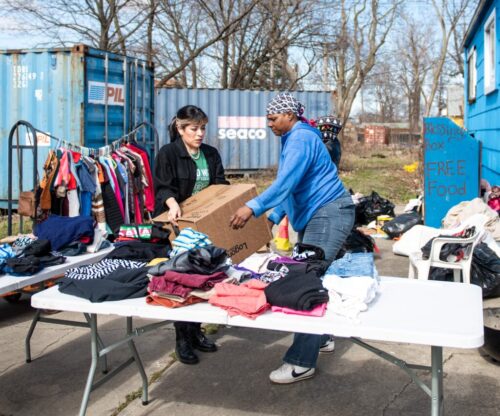
This year’s literacy kits were created around the topics of bravery and courage. Volunteers from Rocket Mortgage packed the kits with “Brave” by Stacy McAnulty, crayons, coloring pages, alphabet tracing pages, scissors, a door-hanging craft, a cape and mask, stickers, and a packet about literacy for kids and adults.
Literacy kits and book fairs help support the important work of literacy coaches. When the Community Schools initiative began in 2021, it created space and opportunity to engage literacy coaches. Many of our literacy initiatives are designed to enhance the work of literacy coaches and provide additional opportunities for students to engage in reading.
BASIC NEEDS OR BOOKS
Providing books to ALICE families is more important than ever as we’ve seen children’s book prices increase by 30% in the last five years, from an average of $15.55 to $20.28. For families struggling to make ends meet, new books are a luxury expense that cannot compete with basic needs.
“A lot of our kids are living below the poverty line, so they don’t have extra money to buy books,” said Amanda Garner, media specialist at Erickson Elementary. “This free book fair is a big deal to a lot of my students.”
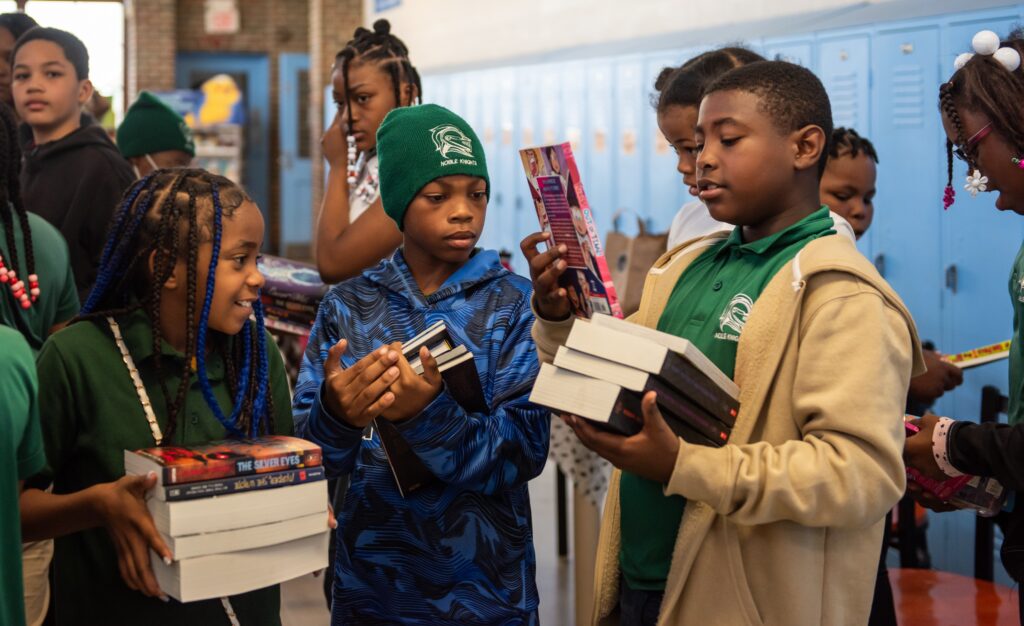
In the past Erickson Elementary has offered a traditional book fair where students pay for books, which left some students out.
“This book fair just feels more equitable— everyone gets the same amount,” said Kelly Mickel principal at Erickson Elementary. “And it makes it exciting for the whole school as opposed to just for some students, who can afford to buy books.”
The teachers witness a school-wide reading frenzy after the book fair. Every student gets to show off their brand-new books to their friends. Students can also feel the difference equity makes.
“I used to pay $10 – $15 for a book at my old school,” said Makai. “But we get free books now, we get five!”
Many of the communities receiving book fairs, little free libraries and literacy kits can be described as book deserts.
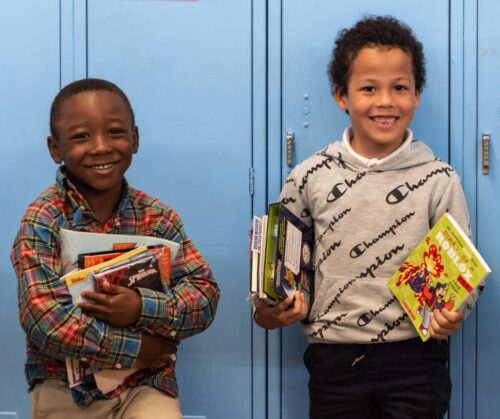
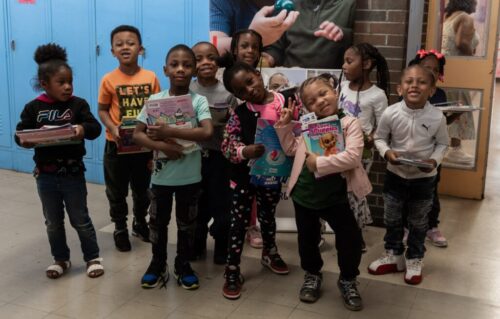
“Book deserts really don’t have many libraries around or stores that sell books for kids,” said Pamela. “As you know it’s just so important, the literacy rates in the city of Detroit are just staggeringly low.”
According to Data Driven Detroit, 71% of third grade students in Wayne County did not met standards in English Language Arts (ELA). That is almost three out of every four students that do not read at their grade level. In Washtenaw County, 52% of third graders did not meet their grade level standards for ELA.
“In our building, more than half of our students are reading at or below grade level,” said Principal Kelly. “And that poses concerns when we have grade level curriculum to teach at grade level— teachers are in the space of I have to meet you where you’re at, but also teach you to the curriculum.”
PREVENTING SUMMER SLIDE
With the summer heat upon us, many teachers and parents are worried about the summer slide, or the loss of learning when children are not engaged educationally throughout the summer.
“The timing of this book fair really keeps those books at the top of their backpacks,” said Principal Kelly. “When they go out for summer break, they’ve got that going in and they get so excited about getting brand new books, and we can build on this gift.”
A 2010 study found that providing easy access to self-selected books for consecutive years of summer reading limits the summer reading setback. The most economically disadvantaged students showed the most reading gains from the self-selected books. At Erickson Elementary, we see this study in action.
“I got two of these PIGGY books, it’s a game on Roblox— it’s fun,” said Makai, “I’m going to be reading in my free time instead of being on the computer.”
To foster an early motivation for reading, it’s crucial that kids have the freedom to choose. Through the book fairs, we can see that books featuring video games and tv show characters are a great way to capture interest from screen time to reading time.
“Kids are so attached to their phones, video games and any type of electronic device— it’s very rarely you see kids with a with an actual book in their hands,” said Pamela. “To see them put their electronic devices away and see them reading and sharing books with their friends is so impactful.”
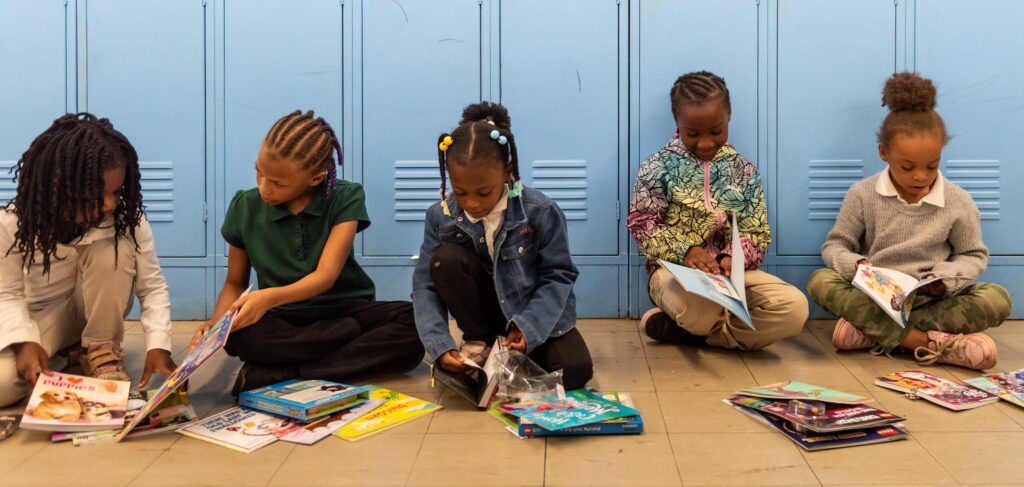
The timing of these new books couldn’t be better as Erickson Elementary students head into their summer break and parents or caregivers step in and encourage reading as the teachers have.
“We read together every night; it’s part of our bedtime routine,” said Robyn Fetterman, para-educator and parent to Nicolyn, a third-grade student at Erickson. “Nicolyn’s into mysteries now, very interested in fantasies, like unicorns and mermaids— whatever she chooses from the book fair today, it’s meant for her.”
After experiencing the book fair, 8-year-old Nicolyn came out with five brand new books, including one mermaid book like her mom predicted. Her interests also pulled her towards some other books about dogs.
“My favorite animals are dogs and horses,” said Nicolyn. “I’m reading ‘Love Puppies’ first.”
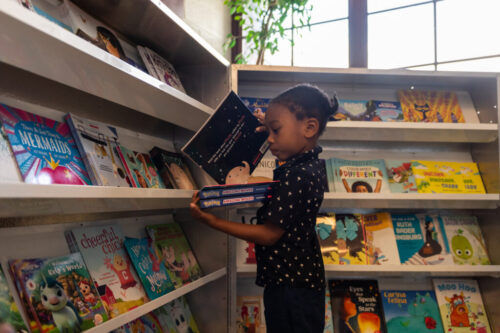
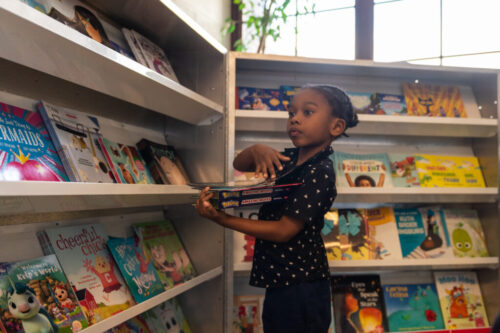
DIVERSITY IN LITERACY STRUGGLES
While childhood education is foundational, we cannot forget that a love of reading can be cultivated at any age. United Way partner and current grantee, Washtenaw Literacy, has been a crucial support for adult learners with funding from our Legacy UWWC Community Impact Fund. Project Manager, Alison Austin, has spent the last 30 years fighting for literacy in Washtenaw County.
“When I got involved with the organization, I didn’t realize the diversity of people that would struggle with literacy,” said Alison. “I didn’t think about people with learning disabilities, intellectual limitations or severe trauma.”
“I didn’t think about ALICE— we didn’t even know the acronym at that time. I didn’t think about ESL or immigrants. There were lots of these groups that were missing in my vision.”
When a person arrives at Washtenaw Literacy, they have the freedom to choose what they want to learn. The organization offers free personal, community and ESL tutoring, along with math and computer skills tutoring, and help obtaining a GED and citizenship.
“We are very driven by the learner,” said Alison. “When we do an intake and we say, ‘What do you want to learn?’ And we’ll find somebody to help you learn that.”
Before the pandemic, Washtenaw Literacy supported about 2,000 learners annually. Currently, roughly 1,000 learners are committed to their literary journey. Over 90% of the adults enrolled in Washtenaw Literacy’s free Personal Tutoring program reach at least one of their goals.
We are very driven by the learner.”
— Alison Austin, Washtenaw United
It is so important to address the full diverse scope of the literacy issue in our region. United Way is incorporating more bilingual books into our fairs, drives and literacy kits. Books in both English and Spanish are important to support to the ESL community in literacy work.
“We are collecting Spanish books and being very intentional about what we are asking for to respect the needs of the community folks are going into,” said Tiffany.
United Way is always expanding our impact to ensure that the entire region is given the resources it needs to strive towards literacy.
Inspired to volunteer or sponsor books? Find opportunities on our volunteer portal, here.
